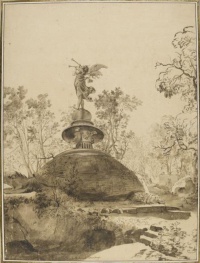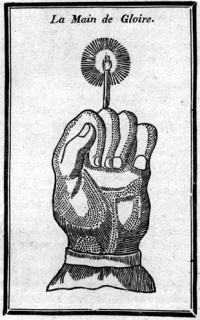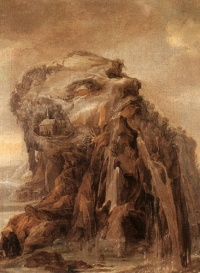Fantastique
From The Art and Popular Culture Encyclopedia


Illustration: Screenshot from A Trip to the Moon (1902) Georges Méliès
See also: fantastic art, fantastic literature


|
Related e |
|
Featured: |
The Fantastique is a term for a literary and cinematic genre that overlaps with science fiction, horror and fantasy.
The fantastique is a substantial genre within French literature. Arguably dating back further than English fantasy, it remains an active and productive genre which has evolved in conjunction with anglophone fantasy and horror and other French and world literature. In French criticism, the term was first widely used to describe the work of German Romanticism, especially E. T. A. Hoffmann, after Jean-Jacques Ampère's 1829 translation of Hoffmann's Fantasy Pieces in the Manner of Callot (1814).
Roger Caillois's defines the fantastique in Au cœur du fantastique as "always a break in the acknowledged order, an irruption of the inadmissible within the changeless everyday legality" (tr. Richard Howard).
Definition
What is distinctive about the fantastique is the intrusion of supernatural phenomena into an otherwise realist narrative. It evokes phenomena which are not only left unexplained but which are inexplicable from the reader's point of view. In this respect, the fantastique is somewhere between fantasy, where the supernatural is accepted and entirely reasonable in the imaginary world of a non-realist narrative, and magic realism, where apparently supernatural phenomena are explained and accepted as normal. Instead, characters in a work of fantastique are, just like the readers, unwilling to accept the supernatural events that occur. This refusal may be mixed with doubt, disbelief, fear, or some combination of those reactions.
Literary theorist Tzvetan Todorov contends that the fantastique is defined by its hesitation between accepting the supernatural as such and trying to rationally explain the phenomena it describes. In that case, the fantastique is nothing more than a transitional area on a spectrum from magic realism to fantasy.
Fantastique literature is often erroneously considered close to science fiction. However, there is an important difference between the two: science fiction is situated in a different time and place than the reader, and irrational seeming events are actually held to be rational in the framework of future or perhaps alien science and technology.
The Fantastique is often linked to a particular ambiance, a sort of tension in the face of the impossible. There is often a good deal of fear involved, either because the characters are afraid or because the author wants to provoke fright in the reader. However, fear is not an essential component of fantastique.
References
Source: The information contained in this article was partly excerpted from: French Science Fiction, Fantasy, Horror and Pulp Fiction by Jean-Marc Lofficier & Randy Lofficier ISBN 0-7864-0596-1.
See also
- Fantasy
- Fantastic art
- Science fiction
- French literature
- French science fiction
- Gérard Lenne on le cinéma fantastique
- List of writers of the "fantastique"
- Midi Minuit Fantastique
- Fantastic literature
- The Fantastic: A Structural Approach to a Literary Genre
- Itinéraires sémantiques : les avatars du mot "fantastique" by Jean-Louis Backès
- Marabout Fantastique

.jpg)


